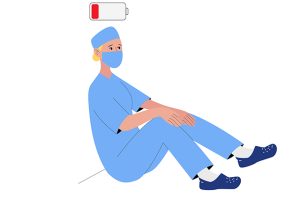Student Life
We believe that creating medicine’s next great leaders is about more than academics and time in the classroom. The Johns Hopkins University School of Medicine gives our students the rare opportunity to live and study in an urban environment in the heart of Baltimore at one of the world’s leading centers of medical advancement and scientific innovation. We enjoy seeing our passionate and diverse student body grow professionally and personally as they soak up all that Baltimore and The Johns Hopkins Hospital have to offer.
Diversity
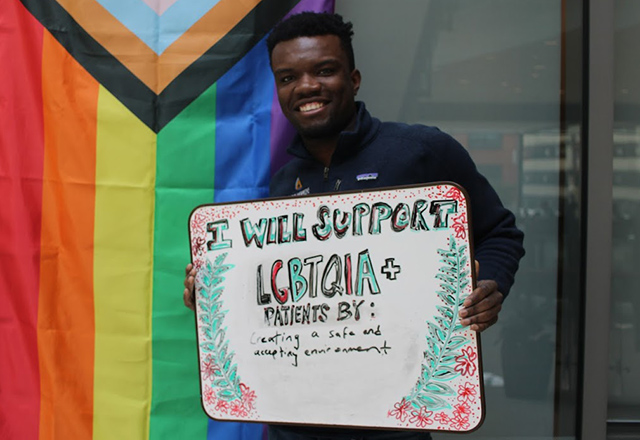
A thriving community is one that incorporates into its fabric many different members with varied experiences and points of view. As an institution, with the full support of leadership at all levels, Johns Hopkins demonstrates our commitment to the principles of diversity and inclusion by striving to create a culture in which all students, faculty and staff feel respected and valued. We believe that recruiting and retaining a diverse community and creating a climate of respect that is supportive of success both encourages innovation and enhances our ability to fulfill our core mission. The school of medicine is uniquely positioned to live these values. The Office for Student Diversity works across the institution at all levels to support both medical and graduate students in reaching their academic and personal goals. Everyone plays a vital role and holds an important stake, whether it is working together to eliminate health disparities or self-educating to become more culturally competent. Baltimore offers ample opportunities to collaborate within and across different communities.
Student Groups and Community Engagement Opportunities

The diversity that is valued at Johns Hopkins is about much more than demographics. The school of medicine highly encourages students to pursue their passions, whether personal, academic or community service-based. The school offers dozens of organized student groups where like-minded students can learn, serve or socialize together, and if you have an interest that is not currently represented, you can always start a new organization. Chances are you will find plenty of company.
Video Baltimore: Our Community
Johns Hopkins Connecting the Community | Asylee Women Enterprise
-
AAMC Organization of Student Representatives JHU Chapter
The Organization of Student Representatives (OSR) is the representation of the undergraduate medical student body of Johns Hopkins to other medical schools in the U.S.; the overall OSR constituency comprises all medical students. The concerns of the OSR lie exclusively within academic medicine and medical education and their improvement.American Medical Association (AMA), Medical Student Section
The AMA Medical Student Section (MSS) is dedicated to representing medical students, improving medical education, developing leadership, and promoting activism for the health of America. The AMA-MSS is the largest and most influential organization of medical students in the country. If you’re interested in learning about healthcare policy, advocacy within organized medicine, community service, or meeting medical students from across the country, please consider joining our AMA-MSS Johns Hopkins Chapter.American Medical Student Association (AMSA)
The mission of the AMSA is to help medical students find the platform upon which they can learn more about social issues and their interplay with medical care, as well as learn more about different avenues to engage with community help, advocacy, and policy change.American Medical Women’s Association (AMWA)
The American Medical Women’s Association aims to advance women in medicine and improve women’s health. We strive to address the pressing need for female role models and mentors, specialized professional development, and increased study of women’s health issues. We achieve this by gathering women physicians together for networking and support, as well as promoting leadership, advocacy and education.Asian Pacific American Medical Student Association (APAMSA)
The local chapter of the The Asian Pacific American Medical Students Association (APAMSA) is comprised medical students committed to addressing the unique health challenges of Asian and Pacific Islander American (APIA) communities. APAMSA serves as a forum for student leaders to engage these health issues and develop initiatives and projects addressing those needs.Catholic Medical Student Association
The mission of the Catholic Medical Student Association (CMSA) is to strengthen medical students in their faith as they aspire to practice medicine in accordance with our faith’s core values and ideals. We are a community that supports one another and the church. CMSA encourages the development of spiritual life, worship, and ethical medical considerations through Mass, conversations with faculty and students, and interfaith dialogue.Doctors for America
Doctors for America is a national nonprofit organization made up of physicians and medical trainees from all over the nation. DFA mobilizes doctors and medical students to be leaders in putting patients over politics on the pressing issues of the day to improve the health of our patients, communities, and nation. The national organization in general and our Maryland/Johns Hopkins chapters have a goal of education of medical professionals and students, as well as grassroots organizing and mobilization in support of or opposition to legislative proposals at the local, state, and national level based on how they will affect the lives of the patients and communities we (will) serve. Through campaigns around expanding health coverage and access to care, fighting for prescription drug affordability, advocating for women’s health, ending youth substance disorder, and treating gun violence with public health prevention, we educate providers and students about the issues and the ways in which each of us can take a leading role in advocating on behalf of our patients.Global Surgery Student Alliance
The Global Surgery Student Alliance is a national organization created to educate, inspire and unite students through engagement and mentorship in global surgery, including anesthesiology and Gyn/Ob. Johns Hopkins is among the first 20 medical schools with a local chapter, focused on awareness, education, research, communication and mentorship. As a student organization collaborating with the school of nursing, the Bloomberg School of Public Health, and the school of medicine, we hope to encourage a sense of unity among students with diverse backgrounds who are passionate about performing and enabling surgical advancements around the globe.International Student Group (F1 Club)
The International Student Group seeks to address issues that are unique to international medical students, such as taxes, immigration issues, financial aid and where to do residency, among other things. We hope to set up a meeting where we have an immigration lawyer to come in and talk about issues that are pertinent to international medical students.Jewish Students Association
The Jewish Students Association provides meaningful programming for Jewish students and the rest of the Johns Hopkins community. Past programs have included Shabbat dinners, happy hours with other Jewish graduate students and young professionals, latke frying, hamentaschen baking, and more. In addition, the JSA has planned a popular Holocaust Remembrance Day event each of the past two years that relates the Holocaust to the medical profession and research ethics. The JSA also serves as a resource for those wishing to connect with the larger Jewish community of Baltimore.Johns Hopkins Graduate Muslim Student Association (JHGMSA)
The Johns Hopkins Graduate Muslim Student Association (JHGMSA) aims to enrich the social and spiritual lives of Muslims at Johns Hopkins University. We promote interaction and communication among all members of the various schools on the East Baltimore campus by hosting events that increase understanding, tolerance, and appreciation of cultures and religions.Latino Medical Student Association (LMSA)
The Hopkins LMSA chapter is dedicated to increasing awareness about Latino health issues through educational opportunities and community building. Further, LMSA strives to provide a community for Latino medical students, and/or those students who wish to work with Latino patients.MedChi Medical Student Section-Hopkins Chapter
The Johns Hopkins chapter of the Maryland State Medical Society (MedChi) Medical Student Section is a policy organization that allows for active participation for medical students at the state and national levels. Overall, MedChi is Maryland’s professional association for licensed physicians. Our chapter echoes MedChi’s mission, “to serve as Maryland’s foremost advocate and resource for physicians, their patients, and the public health.” Our goals include advocacy for policies important to our student body, mentorship in the health policy space, and exposure to the policy and political process. We author and push for the passage of policy resolutions at MedChi and the American Medical Association, host events with state legislators and other prominent individuals, and have social activities to bring together Maryland and D.C.’s policy-oriented medical students and providers.Medical Interfaith Alliance
The Interfaith Council is a group of 20 medical students who have expressed interest in engaging in regular dialogues focused on spirituality and medicine and in planning MIA events/projects.Medical Student Christian Fellowship
What does it mean to live out the Christian faith in medicine? The Medical Student Christian Fellowship is a community for anyone seeking to learn more about Christianity or grow in their faith. We strive to be a student group marked by prayer, love, and service to our classmates and community. We host weekly bible studies along with regular prayer times, campus kindness/outreach events, holiday potlucks, social events, and faculty networking dinners, and we help connect interested students with local churches. Come check us out—no faith background is necessary and all are welcome!Middle Eastern Student Association
The goal of Middle Eastern Student Association (MESA) is to promote mentorship between medical students and Middle Eastern physicians as well as working with the community and other medical students to close health care disparities among Middle Eastern patient populations. We plan to do so with educational events explaining common issues that someone may see with a Middle Eastern patient, connecting to physicians in the Johns Hopkins system and matching them with students as well as working with organizations that help the growing population of Middle Eastern Refugees in the area. We will work to be their advocates.South Asian Medical Student Association (SAMSA)
The South Asian Medical Student Association (SAMSA) is an organization that seeks to unite the South Asian community, as well as share South Asian culture, create dialogue, and take action on health issues and disparities affecting the South Asian population at Johns Hopkins and the greater Baltimore area. SAMSA organizes events such as festival celebrations, Bollywood movie screenings, and potlucks, as well as invites speakers involved in South Asian Health, organizes volunteering opportunities, and empowers students to understand and support the healthcare needs of the South Asian community. In this way we hope to foster camaraderie, promote the learning and expression of South Asian culture, and raise awareness of South Asian health issues and engage with the local community.Student National Medical Association (SNMA)
Student National Medical Association (SNMA) is committed to supporting current and future underrepresented minority medical students, addressing the needs of underserved communities, and increasing the number of clinically excellent, culturally competent and socially conscious physicians. -
Community Adolescent Sex Education (CASE)
The Community Adolescent Sexual Education program is designed to educate youth at local Baltimore middle schools about their bodies and about the positive use and expression of sexuality. It is intended to increase self-esteem, improve relationships, and decrease the incidence of teen pregnancy and the spread of STIs. This program, coordinated by SNMA, includes non-SNMA members from all classes at the schools of medicine, nursing, and public health. Leaders of the CASE program coordinate activities with the administration of the middle schools and recruit Johns Hopkins students to serve as instructors/mentors for the program.Community Care Initiative
The main mission of our organization is to organize a free yearly community-oriented fair facilitating health education and screenings, disease prevention, and resource distribution in East Baltimore.Geriatric Interactions through Volunteering and Education Leadership Initiative (GIVE)
GIVE (Geriatric Interactions through Volunteering and Education) aims to expose medical students to the field of geriatrics through volunteering and educational events.Gertrude Stein Society (LGBTQIA)
We are the school of Medicine, school of Nursing, and school of Public Health LGBTQ+ graduate student organization. We are dedicated to fostering a welcoming environment on campus for students, supplementing the curriculum’s LGBTQ+ material, and advocating for the rights of members of our community.Hopkins Med Engaging Homelessness
One aspect of the mission is to better equip medical students to directly engage with our neighbors experiencing homelessness. In our efforts to address homelessness, we hope to never distance ourselves from the fact that we are surrounded by homelessness every day and that we have neighbors experiencing homelessness. We hope to anchor all our efforts in the goal of engaging in close proximity with our neighbors experiencing homelessness, rather than addressing homelessness in a manner that is physically distant from those experiencing homelessness.Hopkins Med for Harm Reduction (HMHR)
Hopkins Med for Harm Reduction (HMHR) is driven to increase safety and reduce injury by meeting our community members where they are, without passing judgement or alienating those who are already marginalized. Our group is the Johns Hopkins SOM chapter of Baltimore Harm Reduction Coalition, a coalition of community members from across Baltimore city who help reduce risk in those engaging in high-risk behavior. HMHR works on issues including overdose prevention, needle exchange, and sex education.Incarceration and Health Justice Collective
The Incarceration and Health Justice Collective is a group of students at the Johns Hopkins Medical Institutions who recognize the importance of health justice for incarcerated and previously incarcerated persons. We strive to educate ourselves and our peers about health disparities stemming from the carceral system and the societal inequities that manifest through it, to support policy and advocacy initiatives countering mass incarceration and improving healthcare for incarcerated people, and to engage in service projects that empower people whose lives have been affected by the criminal legal system.Medical Education Resources Initiative for Teens (MERIT)
MERIT is dedicated to eliminating health care disparities by transforming Baltimore City high school students into health care leaders. MERIT provides seven years of academic, professional, and social support including academic enrichment, college admissions guidance, summer internships in hospitals and laboratories, and longitudinal mentoring.Refugee Health Partnership
The Refugee Health Partnership seeks to shed light on refugee and humanitarian health issues, both in the USA and globally. We hope to raise greater awareness at the school of medicine about the barriers and difficulties refugees face when accessing healthcare in the United States, as well as the challenges they face prior to arriving in the US. Finally, we seek opportunities to engage directly with the refugee population in Baltimore, both to facilitate their transition to the US and to learn more about their experiences. We partner with organizations supporting local refugee communities, providing one-time volunteer opportunities to students, allowing for engagement and learning between students and refugees living in Baltimore. RHP also seeks to highlight refugee health issues at the school of medicine to promote greater cultural sensitivity and awareness of refugee issues inside and outside of the United States. RHP also organizes the Refugee Health Selective offered to first year students.SHARE (Supporting Hospitals Abroad with Resources and Equipment)
S.H.A.R.E. is an organization that recovers useful medical supplies that would otherwise be discarded in order to donate them to developing countries. The program is entirely managed by volunteer students and other Johns Hopkins community members who use their spare time to collect, sterilize, label, sort and package medical supplies. Most recovered materials come from the operating rooms in clean, usable condition but cannot be reused at Hopkins because of current regulations or surgical practices. The program is run through flexible shifts and task assignments; volunteers can contribute as much time as they want, from one shift per month to serving on the group’s managing board. The room is always open and you can help anytime, an ideal opportunity if you want to help but do not want to commit to a specific time and day every week. You can make your own schedule according to your availability. S.H.A.R.E. is a fantastic way to give a little of your time to have a large impact on the health of people around the world, and we hope you’ll join us.Stitch
The goal of our “Stitch” mentorship program is to increase socioeconomic diversity in medical school classes. Stitch will work with first-year undergraduate students interested in medicine at Morgan State University who come from low-income backgrounds to build social capital around them. The mentors in this network will include an MS1 at Johns Hopkins and an upper-year at the same institution (MSU) as the first-year. These mentors will provide advice on classes and connections for shadowing and research opportunities (as well as AMCAS and interview advice), among other help. We also plan to have MCAT preparation courses provided for free to all of the students in the program. With the low-cost and reproducibility of this program, we hope to impact the lack of socioeconomic diversity in medical school classes.Student Sight Savers Program (SSSP)
The Johns Hopkins Student Sight Savers Program (SSSP) was founded in 2012 to address a community-defined need for improved access to ophthalmological care in East Baltimore.Thread
Thread is weaving a new social fabric in Baltimore and we are looking for volunteers to join our community. Thread disrupts the pattern of social isolation by enrolling 9th-grade students who rank in the lowest 25 percent of their class academically and who face additional challenges outside of the classroom. These students and volunteers form Thread families where they build reciprocal and transformative relationships to help each other through the ups and downs of life. Our students consistently defy the odds: 85% of our students have graduated from high school within six years and 83% of our students have completed a college degree or certificate program. Thread currently works with 527 students and alumni and 1300+ volunteers, with plans to reach 7% of Baltimore’s entire 9th-grade class. We can’t do this without your help! We are looking for volunteers to work with students, lead a team of volunteers, or support our organization as a resource team member based on your skills and expertise. Thread’s work is getting national recognition for its unique approach to connecting people across lines of race, class, and zip code. -
Arts In Medicine Society (AiMS)
Our group serves to be a platform for the creation, discussion, and analysis of the arts as related to medicine. Many of our classmates have diverse and fascinating artistic interests, such as creative writing, theater, dance, music, photography, drawing, visual design, crafting, and many more. We want this group to be a formal space for this creativity to happen, where medicine and the arts can be integrated and enriched by one another.Bump, Set, Spike! (Hopkins Volleyball Club)
We aim to promote student wellness by providing an opportunity to socialize and exercise through the wonderful game of volleyball. We will play in the Intramural leagues that are organized in the Cooley gym and also will have an email list setup to schedule additional practices/teaching sessions and games in the gym/parks/sand courts around Baltimore. We are an inclusive group and aim to get as many people involved as possible!HAPPY (Hopkins Association of People Practicing Yoga)
HAPPY (Johns Hopkins Association of People Practicing Yoga) provides free, weekly vinyasa classes for the Johns Hopkins community centered on mindfulness and wellbeing.Hopkins Dance Company (formerly Hip Hopkins)
Our goal is to provide a space for students and community members to learn different styles of dance, including hip hop, and participate in performance opportunities. We aim to provide a space for creativity and expression through dance. We would like to continue to make medical students aware of community volunteering opportunities that are related to dance and continue to attend these events as representatives of the medical student body.Hopkins Environmental Resourcefulness and Botanical Society (HERBS)
Hopkins Environmental Resourcefulness and Botanical Society (yup, you guessed it: HERBS!) is a student group that offers fertile ground for creating an urban garden, reducing stress, practicing sustainable living, and learning about medicinal botany. All levels of horticultural experience are welcome. Our garden is located between AMEB and the Caroline Street Parking Garage. We grow cucumbers, tomatoes, basil, parsley, and many other herbs and veggies. We hope to build a picnic table and expand to blueberry and raspberry bushes in the upcoming year. Come join us!Hopkins Med Club Tennis
Hopkins Med Club Tennis offers a forum for tennis lovers of all levels to meet up and hit once a week in Patterson Park, weather permitting. Bond over your *love* for the game and even *net*work with faculty members who play too – we’re making a *racquet* with all these puns because having you join the club is sure to be a *hit*!Johns Hopkins Medicine Swim Club and Adult Learn to Swim Program
The mission of the JH Med Swim Club and ALTS Program is to provide a physically and mentally empowering environment where any member of the Johns Hopkins medical community – regardless of swimming experience – can learn to swim with like-minded medical professionals.Local Music Interest Group
Johns Hopkins medicine engaging in the local Baltimore music scene is vital for a sustainable and meaningful connection with the city of Baltimore. Our mission is to facilitate the enjoyment and appreciation of music performed in local Baltimore venues of local and regional artists. We hope that through our club every member of our organization will feel more connected to other Baltimoreans and local venues so they may enjoy their time in this beautiful city.Musicians on Call
We believe that music is medicine, and are honored to have the privilege to treat patients with music. Musicians on Call are medical students who volunteer to perform any instrument of any musical ability to patients at Bayview hospital. During the pandemic, we have been able to deliver performances on Zoom, bringing soothing music to even the patients in the ICU. We hope that in the future we can bring performers into the hospital space itself. We also collaborate with local musicians to bring their musical performances to students and patients.Outdoors Club
The Outdoors Club is an organization to get people outside! We want to give students the resources and support that they need to enjoy the outdoor activities they love and have the opportunity to try new ones. We have monthly events and three large trips throughout the school year ranging from hiking/camping to white-water rafting. Our living library and gear-share resources make it easy for students to access information and equipment. Bring all your expertise (or lack thereof) and enjoy some fun outdoor adventures!Peer Advising
The goal of the Peer Advising Program at the Johns Hopkins University School of Medicine is to support the well-being, both academic and non-academic, of medical students. Medical school cultivates tremendous personal and professional growth and presents new emotional and physical demands. Our mission is to help our peers develop strategies to meet these challenges.Student Preceptorship Program
The Student Preceptor Program was developed in 2009 by JHUSOM students as a structured, peer-to-peer teaching program to meet the need of providing training in medical education to fourth-year medical students who would be expected to be able to teach as an intern very soon.Student Wellness Initiative
The Student Wellness Initiative (SWI) aims to create a positive culture of wellness and support throughout the medical school by collaborating with students, faculty, and administration to implement student-driven wellness programming and promoting a learning community culture that supports care of self and others! We hold events throughout the school year – including wellness workshops, craft nights, and healthy cooking classes (in partnership with Teaching Kitchens). We also partner with the Office of Wellness and Health Promotion to bring therapy dogs, free massages, and kittens to campus during stressful times.The Teaching Kitchen
Our group works with dietitians to create healthy meals that we then teach to medical students by cooking with them! In this way, we strive to augment medical student education on nutrition. -
Aerospace Medicine Interest Group
The aerospace medicine interest group is a student organization designed for the extracurricular education of students interested in topics in aerospace medicine. The group aims to facilitate discussion and learning through invited speakers, events, and forums to generate interest in the aerospace medical field and inspire careers in aerospace medicine. While learning aerospace medical topics, students will also develop a deeper understanding of the common principles that drive terrestrial medicine as presented in the GTS curriculum.Anesthesiology Interest Group (AIG)
Our organization’s mission is to provide medical students interested in careers in anesthesia or anesthesia subspecialties with opportunities to learn more about the specialty and interact with residents, fellows, and attendings. We especially hope to provide information that helps students deciding on a specialty choice to make an informed decision about anesthesia and to guide students interested in the specialty to the proper resources and academic/research opportunities that will allow them to become competitive applicants into anesthesia residency programs. We aim to achieve these goals by organizing educational sessions (talks, workshops, Q&A sessions, shadowing programs) that increase student exposure to anesthesia and helping connect students interested in the field with clinical and research mentors.Bioethics Interest Group
The bioethics interest group aims to promote student interest in bioethics through a broad range of activities, including clinical and scientific case discussions, bioethics journal clubs, speaker events, and collaboration with other student groups whose areas of interest overlap with our own. We hope to provide a safe environment in which to discuss controversial issues and to promote thoughtful reflection about the dilemmas we students are likely to encounter in our clinical rotations and beyond. We’re always happy to welcome new members, whether you’re already a published bioethicist, hoping somebody can explain what the big deal is with this whole “ethics” thing, or anywhere in between!Cardiothoracic Surgery Interest Group
To help students learn about the field of cardiothoracic surgery, to expose students to faculty and experiences in cardiothoracic surgery, and to provide students with the opportunity to collaborate with other students who share their interest in CT surgery.Choosing Wisely STARS
A student group dedicated to high-value healthcare and reducing wasteful medical spending.Dermatology Interest Group
The Dermatology Interest Group aims to provide medical students with increased exposure to the field of dermatology including networking, mentoring and research opportunities. We hope to bridge the gap between faculty and students to help students interested in the field gain more experience and a broader understanding of what a career in dermatology could look like.Emergency Medicine Interest Group
To connect medical students with the field of Emergency Medicine (EM), to provide resources and experiences that will help them explore EM and consider a future career in the field. To provide resources to students applying into EM about applications, interviews, and the match process including connecting these students with current attendings, residents, and older students.Gastroenterology Interest Group
We are a medical interest group with specific interests in gastroenterology. Our goals are to increase awareness and exposure to the field of gastroenterology, to provide opportunities to participate in clinical, research, and activities in gastroenterology, and to connect students to faculty and staff in the field of gastroenterology. Our activities include talks, networking, and conference opportunities.Genetics in Medicine Interest Group (GiMIG)
The Genetics in Medicine Interest Group aims to provide opportunities for medical students to learn about the rapidly progressing field of genetics and the exciting advances that hold the promise of individualized medicine. Our group not only offers support to those pursuing a career in Genetic Medicine, but also ways for any type of doctor to incorporate concerns about genetics into their practice.Hopkins Health Innovation and Technology (Hopkins HIT)
Hopkins Health Innovation and Technology (HIT) is a student run organization focused on advancing digital health, medical technologies, clinical education, and other forms of health innovation. Our mission is to make health innovation & technology more accessible to students of all backgrounds, as well as fostering interdisciplinary collaborations between faculty members, companies, and trainees. These opportunities include research, entrepreneurship, policy, and bioethics.Hopkins Health Management Advisory Group (HHMAG)
HHMAG provides medical students exposure to hospital management and administration early in their medical careers. HHMAG pairs student “consulting” teams with faculty mentors to complete a project that will directly impact operations in our hospital. Projects will run roughly from February to May, and previous projects have examined medication management in Epic, stroke protocols in the ED, patient satisfaction in the ED, and more. For those students who think they may one day be interested in holding departmental or hospital-wide leadership positions, HHMAG projects are an excellent opportunity to learn about management responsibilities early on.HOPSY (Hopkins Psychiatry Interest Group)
The mission of HOPSY is to bring together medical students, residents, and faculty to talk about psychiatry and offer a safe place for medical students to ask questions about the field.HUM-AN (Humanism in Anatomy)
HUM-AN (Humanism in Anatomy) is a student group dedicated to the emotional, social, and philosophical aspects of the study of anatomy with the aid of human cadavers. We aim to support students during first-year anatomy, honor the people who gave their bodies to our study, and engage with the historical and ethical dimensions of cadaver acquisition and use.Infectious Disease Interest Group
The mission of the Infectious Diseases (ID) Interest Group at Johns Hopkins is to (A) expose medical students to the many career opportunities in infectious diseases, (B) help interested students gain experience in infectious disease research and clinical care, (C) provide clinical and research mentorship to students interested in ID, and (D) build a supportive community of individuals working in infectious disease at all stages of their careers.Internal Medicine Interest Group
The Internal Medicine Interest Group (IMIG) is targeted towards students pursuing careers in Internal Medicine and related subspecialties, or who are considering several career choices and would like to learn more about Internal Medicine.Math in Medicine
The Math in Medicine Interest Group at JHUSOM promotes awareness, understanding, and furthering of mathematical work that underlies advances in medicines among medical students and the larger community.Med-Peds Urban Health Interest Group
Our main mission is to expose medical students to Med-Peds and the variety of opportunities for volunteering and research involvement. We want to share information about the training process, versatility of paths within Med-Peds, and open the conversation about important urban health topics.Military Medicine Interest Group
The mission of the Military Medicine Interest Group is a) To provide medical students either on the HPSP military scholarship or those who are interested in military service the opportunity to meet and interact with other students and faculty with military experience, facilitating career guidance and mentorship; and b) To help build a community for students and faculty with military experience through shared events.Neurosurgery Interest Group (NSIG)
The Neurosurgery Student Interest Group (NSIG) is dedicated to stimulating and supporting medical student interest in the field of neurosurgery. NSIG’s goals include providing opportunities for students to interact with neurosurgery residents and faculty, to learn about training and research opportunities, and to find mentors within the Johns Hopkins Neurosurgery Department. Activities include talks by residents and faculty members, journal clubs related to research in neurosurgery, a shadowing program, and an opportunity to attend weekly Neurosurgery Department Grand Rounds.Nutrition in Medicine Interest Group
The Nutrition in Medicine Interest Group seeks to inform medical students about the importance of nutrition in clinical practice, how to counsel patients on nutritional topics, and how to work with dietitians to develop personalized nutritional plans for patients. We seek to help future physicians be able to incorporate nutritional information into their practice taking into account the context of their patients’ lives.Ophthalmology Interest Group
The Ophthalmology Interest Group (OIG) strives to provide students with exposure to the clinical, technical, and research aspects of ophthalmology throughout their preclinical and clinical education. The OIG is responsible for hosting a number of events that provide the means for students to network with residents and faculty, practice technical skills (including corneal suturing and using the slit lamp), and learn about ophthalmology, research, and the match process from current 4th year students. As there is simply not enough time in the preclinical and clinical curricula for all students to explore the field of ophthalmology, we believe it is important to provide students with numerous opportunities to get early exposure to the field, identify potential interests, and connect them with the appropriate resources for research, clinical education, and mentoring.Orthopaedic Interest Group
The Orthopedic Interest Group (OIG) brings together students interested in orthopedic surgery and facilitates members in exploring and gaining experience in the field. We create opportunities for interaction with faculty and residents, exploration of research opportunities, participation in hands on workshops, and more!Otolaryngology – Head and Neck Surgery Interest Group
The Otolaryngology – Head and Neck Surgery Interest Group seeks to introduce medical students to the diverse specialty and subspecialties of otolaryngology – head and neck surgery. Activities will be centered on connecting students with residents and faculty members in the department, and will include: faculty lectures, a hands-on scope course, exposure to ongoing research in the department, and opportunities to meet other medical students interested in otolaryngology.Pathways – Pathology Interest Group
To help medical students interested in pathology learn more about the field and connect them with opportunities for getting more involved with pathology at Johns Hopkins.Pediatric Alliance
Our mission is twofold: to expose medical students to pediatrics and related subspecialties, and to connect students with opportunities for community service for pediatric patients. Our goal is to connect students with pediatric faculty and residents, and to build a community of medical students who are interested in contributing to the field.Physical Medicine and Rehabilitation Interest Group
Inspire interest in the field of Physical Medicine and Rehabilitation, promote a multidisciplinary, patient-centered approach to healthcare, and maximize quality of life for our community through networking, educational, and community service events.Plastic Surgery Interest Group
PSIG aims to introduce students to all aspects of Plastic and Reconstructive surgery and the different specializations available within the field. We hope to achieve this through resident and faculty panels, monthly teaching sessions, and other related networking events. We also aim to encourage female medical students to pursue Plastic Surgery, to encourage more gender diversity in the field.POPSICLE
The POPSICLE (Pediatric Oncology Patients: Students in Children’s Life Experiences) program seeks to expose medical students to the field of pediatric oncology through volunteering with patients and their families in the inpatient and outpatient units. These children often face long hospital stays and extremely difficult experiences, and we hope to provide companionship and bring some joy to their hospital visits. We bring crafts and games to the unit to play with the children as they are waiting for their appointments.Primary Care Interest Group
The Primary Care Interest Group (PCIG) exposes medical students to career opportunities in primary care and family medicine, connects them with physician mentors in these fields, and fosters discussion on relevant issues.Redefining Disability
Redefining Disability partners with the Kennedy Krieger Institute to provide medical students with experience with working with people with disabilities and exposure to related careers.Seldinger Society for Interventional Radiology
The Seldinger Society is the Johns Hopkins University School of Medicine society for students interested in Interventional Radiology. We aim to expose, encourage, and guide medical students at Johns Hopkins and other medical schools to the field of Interventional Radiology through various events and educational opportunities. The Seldinger Society facilitates networking and shadowing opportunities for medical students, organizes panels and lectures on Interventional Radiology topics, and hosts an annual Medical Student Interventional Radiology Symposium in the spring.SIGO – Student Interest Group in Oncology
The mission of the Student Interest Group in Oncology (SIGO) is to foster student interest in the medical field of oncology through networking, panels and oncology related education conferences. We organize career panels with oncologists at different levels of training and shadowing opportunities which coincides with the Hematology/Oncology block of the GTS curriculum.Surgery Interest Group
We work as a group to educate medical students on the rewarding nature of surgery and its many fields. We aim to connect students with faculty within the different departments to shadow within the OR to determine if the field could be a right fit for them in addition to connecting the students to the faculty for research opportunities. We work to make panels and informational session with the range of work one can do within this great field.TEACH
The Johns Hopkins branch of TEACH is just one of 9 in various hospitals around the country. The mission of TEACH is to address the need for interaction and activity, the craving for a personal bond, and the lack of mental and physical stimulation exhibited by hospitalized children. TEACH modules challenge children to think creatively and bring an element of fun to an otherwise monotonous day. From the volunteer perspective, TEACH provides an excellent opportunity for volunteers to improve their interpersonal skills and creative teaching to help children of all ages understand and enjoy the modules. Watch to see more from TEACH.Teaming Up for High-Value Care
The provision of high-value health care is fundamentally a team-based practice, involving not only physicians but also CRNPs, PAs, RNs, pharmacists, MAs, technologists, and many other health care professionals or office staff who regularly contribute to patient care. Teaming Up for High-Value Care is a multidisciplinary student group founded between the schools of medicine and nursing at Johns Hopkins University to create value-based interprofessional learning opportunities for trainees through collective participation in high-value practice educational programming.Trauma-Informed Care Interest Group
This interest group intends to fulfill three objectives: (1) bring awareness to the impacts of trauma throughout the lifetime, (2) give students the confidence to compassionately discuss incidences of trauma with patients, (3) provide students with the tools to help build resilience and coping skills with patients.Women in Surgery Interest Group
The Women in Surgery Interest Group (WSIG) is a student-initiated organization with a mission of encouraging and empowering aspiring female surgeons to reach their personal and professional goals. Beyond providing exposure to surgery and its subspecialties, WSIG provides a forum for aspiring female surgeons to network and seek mentorship from peers, residents, and faculty.Women’s Health Interest Group
Our mission is to expose medical students to the practice of Gynecology and Obstetrics through meetings and events. Our primary event is What does an OB/GYN do? Night where students learn hands on what an OB/GYN does. We also aim to connect students to faculty within the department for shadowing and research opportunities.
Got A Minute? Meet Earl! Hopkins Med Student
You Are Here! JHUSOM is the place you want to be!
Got A Minute: Meet Viviane
SOURCE (the community engagement and service-learning center for the Johns Hopkins University Schools of Public Health, Nursing and Medicine) supports students and student groups with a wide variety of community engagement opportunities through partnerships with 100 plus non-profit organizations in Baltimore City. Involvement opportunities include one-time, short-term, and longitudinal service projects for individuals and groups.
Involvement at Johns Hopkins takes other forms as well. The school of medicine counts on student input and involvement for just about every decision. Students regularly sit on important school-sanctioned committees and take part in official activities. The development of the Genes to Society curriculum and the design of the Armstrong Building are just two examples of recent transformational changes to the school of medicine in which students had a voice. Not all opportunities for student involvement are quite so serious, however. Students sit on plenty of ad hoc committees, influencing school decisions on topics like decorating, entertainment and social events.
Student Government
Mental and Physical Health
College Advisory Program
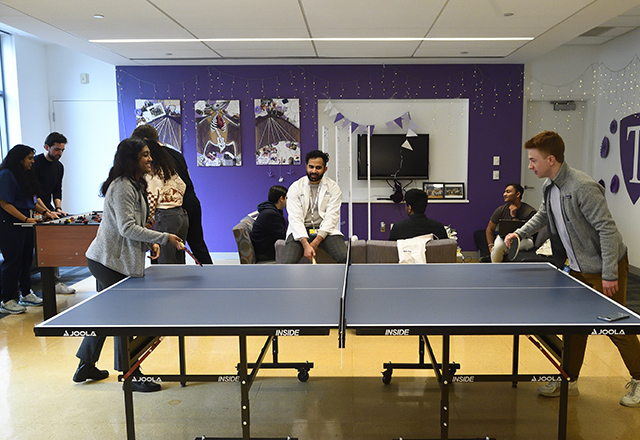
An integral part of life in the school of medicine is the Colleges Advisory Program, in which students are organized into four colleges for the length of their education at Johns Hopkins. Named for four legendary former faculty members, Florence Sabin, Vivien Thomas, Daniel Nathans and Helen Taussig, the colleges include 24 current core college faculty who devote 20% of their time as advisers, mentors and Clinical Foundations instructors to a total of 20 students each (five from each of the four current M.D. classes). The program provides every medical student with a dedicated and longitudinal mentor, enhancing their personal and professional growth and career development.
Medical Education Facilities
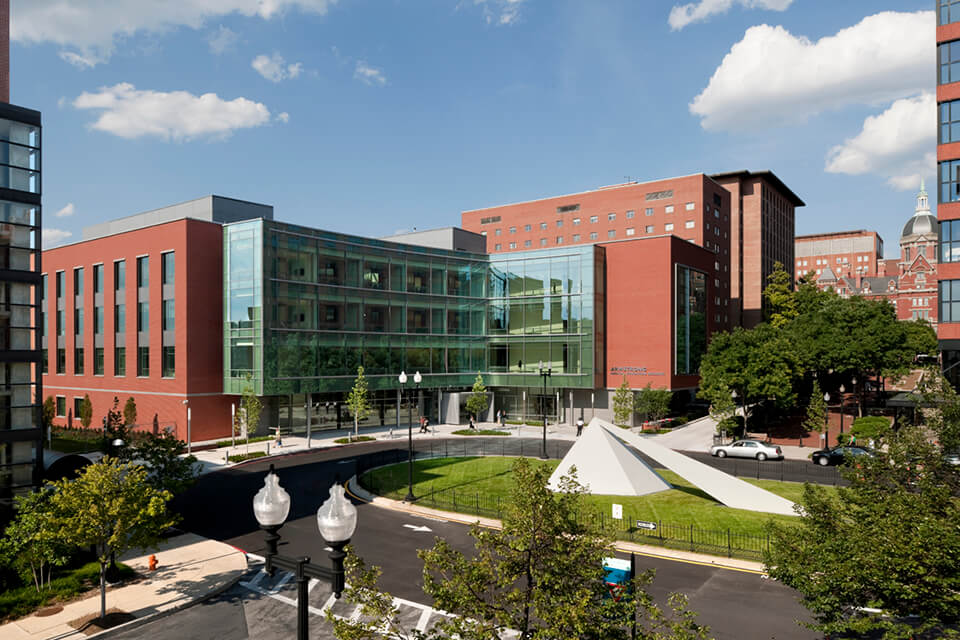
The hub of activity for students at the school of medicine is the campus's medical education center, the Anne and Mike Armstrong Medical Education Building, opened in 2009 to coincide with the launch of the Genes to Society curriculum for which the building was specifically designed.
This state-of-the-art facility is the ideal physical expression of the Johns Hopkins educational philosophy: a center for active, collaborative learning with spaces that provide for every kind of learning opportunity: spacious lecture halls, intimate learning studios, private study areas and communal gathering areas. Students will also frequent the Simulation Center, the result of a partnership between the school of medicine and The Johns Hopkins Hospital, which highlights the commitment of both institutions to enhancing educational opportunities as well as patient safety. The “Sim Center” affords both current and future health care professionals the opportunity to hone skills and practice advanced techniques using five different types of simulation.
Explore the Campus
- Take a virtual tour of the Armstrong Building
- Discover the advanced facilities of the Simulation Center
- Find your way with the Medical Campus Map
Biomedical Odyssey Blog
-
April 28, 2025
Mutual Aid Organizations in Baltimore

-
April 23, 2025
Newly Published Design of Prosthetic Hand Able to Differentiate Shapes and Textures
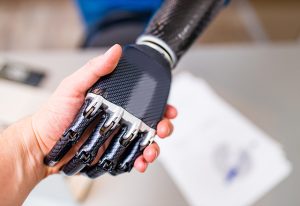
-
April 17, 2025
Missing Out and Moving Forward: Reflections from a Ph.D. Student on Love and Loss

-
April 15, 2025
The Often-Overlooked Side of the Physician-Patient Relationship
